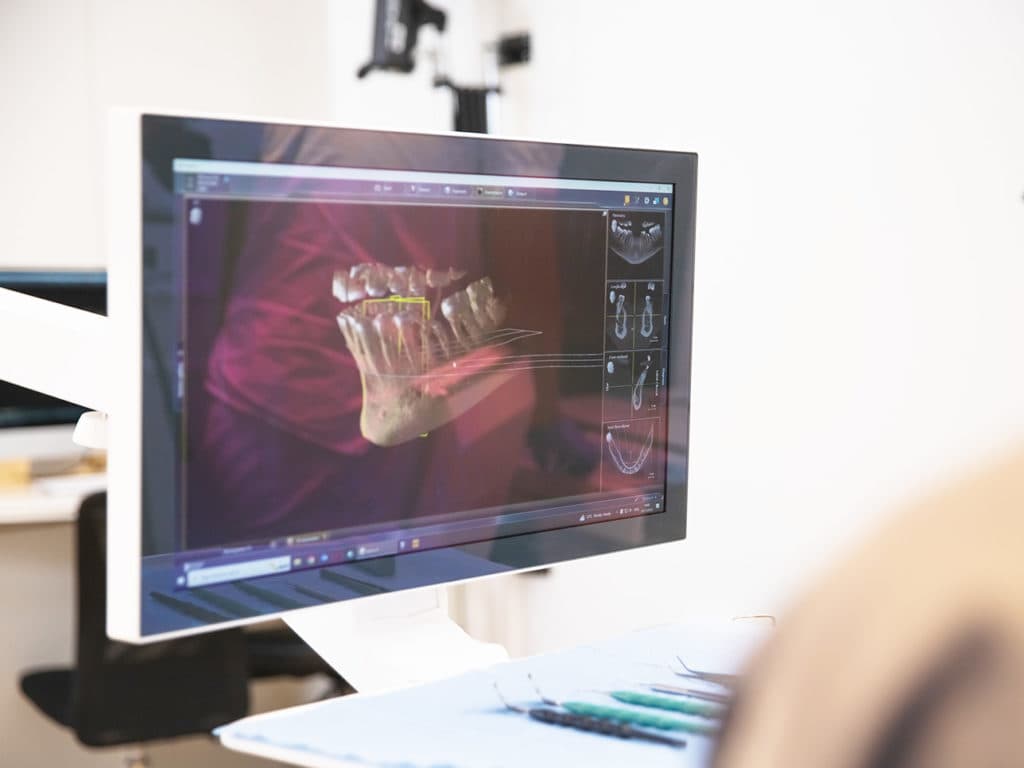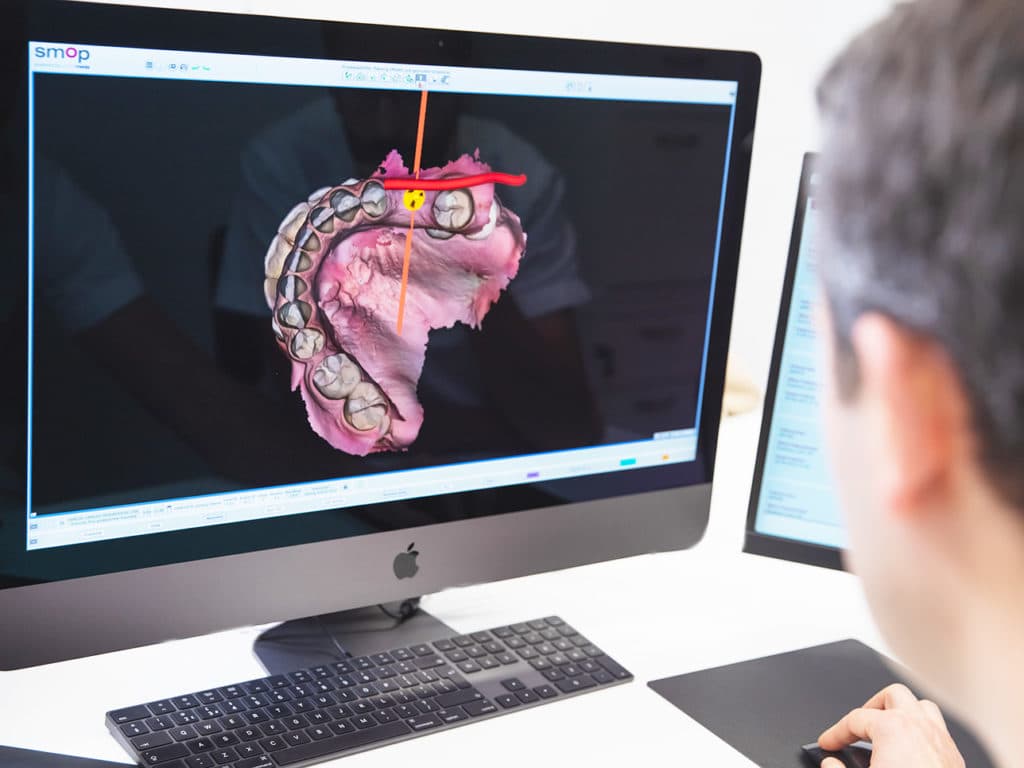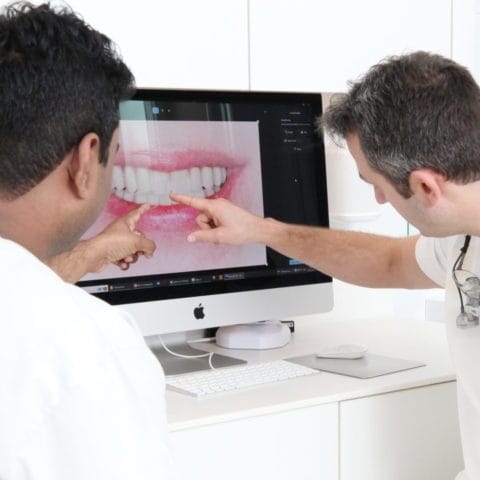Navigated Implants in London
The successful placement of dental implants involves a perfect positioning of the implant into the jaw bone. This process is much more accurate and predictable if using computer-navigated surgery and advanced 3D imaging. This also results in less invasion and much more comfortable procedure for both the surgeon and the patient.

Treatment Duration
1+ hour for each implant

Price
From £2800

Recovery Time
1+ day

What are navigated implants?
Navigated implants involve utilising computer-navigated surgery to insert the implant into the jaw bone with the highest levels of accuracy. Using advanced 3D imaging, the dentist can visualise the bone and position the dental implant in the right position, at the optimal angle and depth. This precision computer-aided technology not only helps us deliver the highest quality dental implants but also heightens the efficiency and comfort of the treatment, as the dentist is able to complete the treatment quicker and with less invasion without compromising on precision or accuracy.
Furthermore, by utilising this technology at the forefront of digital dentistry, we’re able to record every aspect of your placement allowing for future restorations to be easily reproduced more efficiently.
What happens during navigated implant surgery?
- The first step for all of our surgical procedures is to have a consultation with one of our dentists. In this consultation they will ask about your dental history, your oral health and any aspects of your lifestyle that might have an impact on the success of the treatment (e.g. do you smoke). Our dentist will then inspect your mouth and assess the extent of the situation so that they can devise an appropriate dental treatment plan. Once they have explained the recommended course of action and talked you through the procedure, they will book in an appointment for your 3D scan and other diagnostic records.
- On the day of your 3D scan, you’ll come to our state-of-the-art dental practice in central London. A 3D cone beam computer tomography (CBCT) X-ray along with digital impressions and digital photographs of your mouth and teeth are taken so that we can begin our preparations for the surgery.
- Using our innovative digital dentistry technology and techniques, we can then merge the CBCT, the digital photographs and impressions in a software program and virtually place the implant into the proper position to obtain the correct measurements, angle and depth required ahead of surgery. This also helps us create a highly precise and comfortable dental implant position for you. Then a computer-assisted implant guide is printed.
- On the day of your surgery, you’ll come back to our dental clinic off Wimpole Street (just adjacent to the famous Harley Street) and be greeted by your dentist. They will explain all the steps of the procedure again as well as what you can expect immediately after surgery. When you’re happy to proceed, the implant guide will be used to precisely insert the implant in the pre-planned position. Using digital image guidance for the most accurate placement even allows us to have temporary tooth prepared in advance! You can opt to be sedated for the surgery by one of our anaesthetists so as to avoid feeling any pain or discomfort throughout.
- After the surgery, you will be advised on what to do in order to secure the best chances of recovery and success for the implants.
Meet your award-winning Navigated Implants dentist and team…
- We have over 75+ years of combined dentistry experience across our specialist team.
- 10,000+ treatments performed and counting.
- We are leaders in the dental industry – we regularly teach, lecture and publish our research work internationally.
Our Expertise
Dental implant surgery is always a big decision to make and can have life-changing results in regards to boosting self-confidence and restoring teeth function if you’ve previously lost teeth. We recognise that it’s not an easy or quick decision to make, but here are a few key reasons why you can trust Wimpole Street Dental Clinic is the right choice for navigated implants.
We’ve invested in the best digital equipment and training for navigated implants. Not only do we have and use some of the most advanced cutting-edge dental technology in the UK (3D X-ray machine in-house, digital scanning technology, professional photography equipment and the latest implant planning software), but we also advise others on how to use it. We regularly present lectures, and training and write in dental publications about such digital dentistry techniques and research.
We’re a team of highly experienced and highly trained London dentists. All of our staff regularly undertake new training to better themselves and the dental care they can provide to our patients. Not only is our team incredibly friendly and amiable but they are also hugely knowledgeable about digital dentistry. As such, Wimpole Street Dental Clinic is one of the few dental practices nationally that offers navigated implants and other digital dentistry techniques as part of its service offering.
Navigated Implants Before & Afters

Sophie W
I not only received a solution to my dental problem but also I left with renewed confidence in my smile, all thanks to the wonders of modern dental technology and the skilled hands at Wimpole Street Dental Clinic.
What happens during navigated implant surgery?
The first step for all of our surgical procedures is to have a consultation with one of our dentists. In this consultation they will ask about your dental history, your oral health and any aspects of your lifestyle that might have an impact on the success of the treatment (e.g. do you smoke). Our dentist will then inspect your mouth and assess the extent of the situation so that they can devise an appropriate dental treatment plan. Once they have explained the recommended course of action and talked you through the procedure, they will book in an appointment for your 3D scan and other diagnostic records.
On the day of your 3D scan, you’ll come to our state-of-the-art dental practice in central London. A 3D cone beam computer tomography (CBCT) X-ray along with digital impressions and digital photographs of your mouth and teeth are taken so that we can begin our preparations for the surgery.
Using our innovative digital dentistry technology and techniques, we can then merge the CBCT, the digital photographs and impressions in a software program and virtually place the implant into the proper position to obtain the correct measurements, angle and depth required ahead of surgery. This also helps us create a highly precise and comfortable dental implant position for you. Then a computer-assisted implant guide is printed.
On the day of your surgery, you’ll come back to our dental clinic off Wimpole Street (just adjacent to the famous Harley Street) and be greeted by your dentist. They will explain all the steps of the procedure again as well as what you can expect immediately after surgery. When you’re happy to proceed, the implant guide will be used to precisely insert the implant in the pre-planned position. Using digital image guidance for the most accurate placement even allows us to have temporary tooth prepared in advance! You can opt to be sedated for the surgery by one of our anaesthetists so as to avoid feeling any pain or discomfort throughout.
After the surgery, you will be advised on what to do in order to secure the best chances of recovery and success for the implants.
Take your first step with Wimpole Street Dental Clinic
Discover the path to a brighter smile with Wimpole Street Dental Clinic! Our team of skilled professionals utilizes advanced technology to provide personalised dental care in a comfortable setting.



New page design
Written by: Prof Dr Christian Mehl
Medically reviewed by: Dr Raul Costa
Author biography added
Written by: Prof Dr Christian Mehl
Medically reviewed by: Dr Raul Costa
Original content created
Written by: Prof Dr Christian Mehl
Medically reviewed by: Dr Raul Costa
Wimpole St Dental Clinic has strict sourcing guidelines and relies on peer-reviewed studies, academic research institutions, and medical associations. We avoid using tertiary references. You can learn more about how we ensure our content is accurate and current by reading our editorial policy.
- Chen P, Nikoyan L. Guided Implant Surgery: A Technique Whose Time Has Come. Dent Clin North Am. 2021 Jan;65(1):67-80. doi: 10.1016/j.cden.2020.09.005. Epub 2020 Nov 2. PMID: 33213716.
- Wu Y, Wang F, Fan S, Chow JK. Robotics in Dental Implantology. Oral Maxillofac Surg Clin North Am. 2019 Aug;31(3):513-518. doi: 10.1016/j.coms.2019.03.013. Epub 2019 May 15. PMID: 31103316.
- Panchal N, Mahmood L, Retana A, Emery R 3rd. Dynamic Navigation for Dental Implant Surgery. Oral Maxillofac Surg Clin North Am. 2019 Nov;31(4):539-547. doi: 10.1016/j.coms.2019.08.001. PMID: 31563194.
- Rawal S. Guided innovations: Robot-assisted dental implant surgery. J Prosthet Dent. 2022 May;127(5):673-674. doi: 10.1016/j.prosdent.2022.03.029. Epub 2022 May 26. PMID: 35643826.
- Herklotz I, Beuer F, Kunz A, Hildebrand D, Happe A. Navigation in implantology. Int J Comput Dent. 2017;20(1):9-19. PMID: 28294202.























